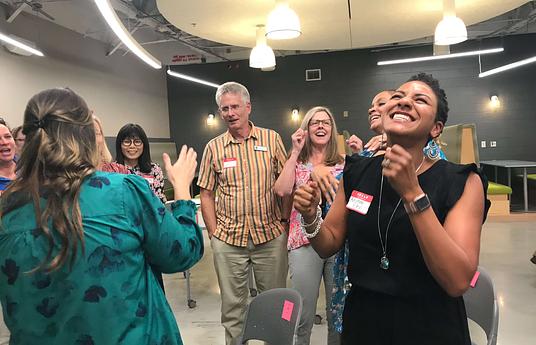‘We have been talking a lot about ideas, but I want to talk about people. In particular – teachers,’ begins Emma Scripps, co-founder of The Teachers Guild, USA.
‘At The Teachers Guild, we believe teachers are the innovators education has been waiting for. But not just that, they are the makers, the activists, and the civic leaders education has been waiting for.
While teachers play so many important roles in our schools and society, there's this misguided and persistent myth that we must prioritize either student learning or teacher learning, and this limits teachers capacity for growth and their ability to make a difference in their classrooms and their districts.
The research is really clear, teachers are the drivers of learning in our schools. John Hattie’s groundbreaking research points to the importance of what he calls collective teacher efficacy, and that is their collective belief to create change. He compiled 500 meta-analyses of 50,000 studies. Consistently, collective teacher efficacy is more impactful on student learning than teachers’ estimation of student ability, than scaffolding, and so on. He identified 247 other in and out of school influences – teacher efficacy is the single most important one. When teachers believe in their capacity to create change, amazing things happen in school systems.
We at The Teachers Guild focus on lifting up teachers’ belief to create that change.
Meet Tiffanie Harrison, an educator in a Texas high school. The challenge she was facing is that while 25% of students were black or Hispanic, they faced 50% of the disciplinary measures. She saw an opportunity to support a largely white staff to have radical conversations about the intersections of power, privilege, and race, so she created the elevation framework. That framework led to the very first all-black student union group in her district. In her words, “I know now that teaching is powerful, its impact is exponential.”
Karen Heil is a middle school science teacher in the Bronx who rallied against school regulations that restricted school trips. Hoping to stoke students’ curiosity, her idea was to set up Mars Week, a week dedicated to piquing students’ interest in space exploration. She said, “ I used to be hesitant to try new ideas due to fear of failure. Now, I use failure to moderate the idea and make it successful”.
Letitia Cimino, an assistant principal in San Diego, had an idea to differentiate the bell schedule to accommodate the different development needs of students aged 6-12 years. “I realize that my voice is important, our school has begun to believe in our capacity to create real change.”
We know creating innovative and agile school systems starts with teachers. Teachers are the closest to students, that means they are closest to interesting, innovative and impactful ideas that can create change today.
To date, we have galvanized over 100,000 educators globally and we believe that collectively their capacity to create change and their belief in themselves will have an outsized impact.’
Like what you've heard so far? Find a playlist of videos from the HundrED Summit here.



